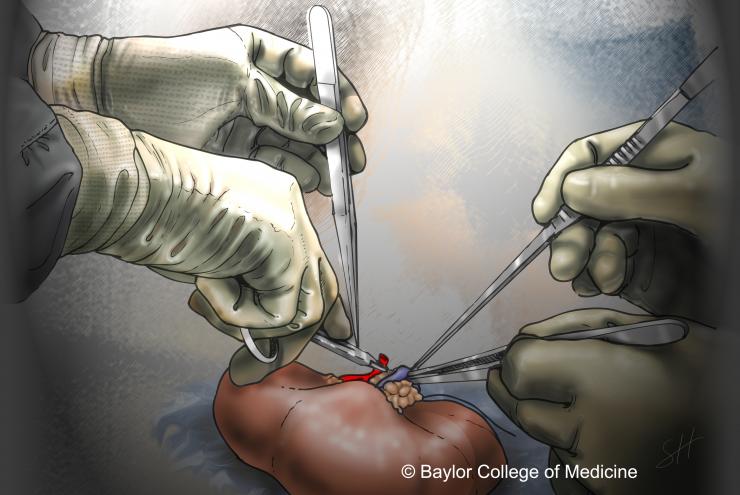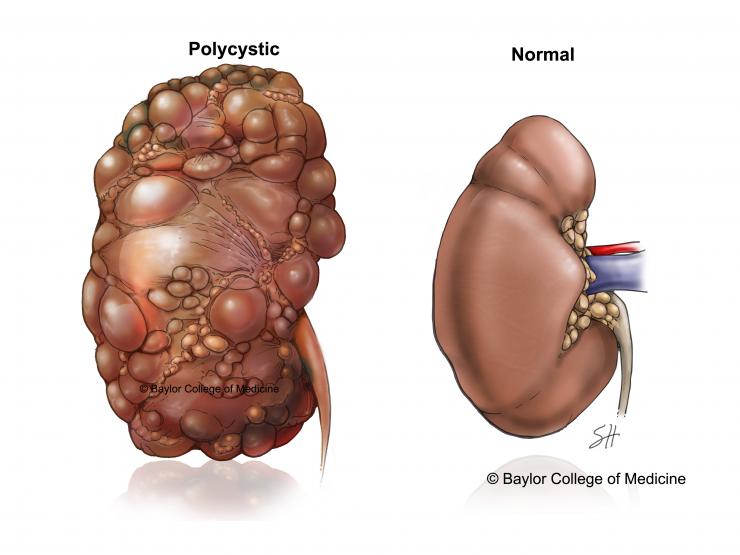What is a kidney (renal) transplant?

A kidney transplant gives you a healthy kidney from another person. You may need a transplant if your kidneys work poorly because of diabetes, high blood pressure, or another illness.
You need only one kidney to live. The new kidney can do the work that your own kidneys cannot. It will remove waste from your blood. It will keep your body’s fluids and chemicals in balance. A new kidney can improve the quality of your life. You are likely to feel better and have more energy.
The new kidney may come from someone you know, a stranger, or a person who has died. Getting a new kidney can sometimes take a long time. You have to meet certain rules to be able to get a kidney. For example, your overall health (other than kidney problems) has to be good. If a relative or another living person has a kidney that is a good match, you may not have to wait long. If you need a kidney from a person who has died, your name will be put on a waiting list.
Why is a kidney transplant done?
Kidney transplant surgery is done so that a healthy kidney (donor kidney) can do what your diseased kidney can no longer do. Kidney transplant is used when you have severe chronic kidney disease (renal failure) that cannot be reversed by another treatment method. You will not be able to have this surgery if you have an active infection, another life-threatening disease such as cancer, or severe heart or lung disease.

Your doctor will put the new kidney in your body and leave your own kidneys where they are, unless there is a reason to take them out. Your doctor will connect the blood vessels of the new kidney to your blood vessels, and the ureter of the new kidney to your bladder. A ureter is the tube that carries urine from the kidney to the bladder. The new kidney may make urine right away. But in some cases it may take a while to work. If the new kidney does not work right away, you will have dialysis until it starts to work.
The transplant usually takes from 3 to 6 hours. You may stay in the hospital 5 to 10 days. After you leave the hospital, you will have follow-up visits to make sure the kidney is working well. The living person who gives a kidney to you will likely stay in the hospital for about a week.
Living donor kidney transplant
For a living-donor kidney transplant, the recipient's diseased or damaged kidneys usually are left in place. The donor's kidney is placed in the recipient's lower abdomen and connected to blood vessels and the bladder. The recipient's and donor's surgeries are carried out at the same time in different operating rooms.
iSwap Program
In the iSWAP program, candidates with a living donor who is medically able, but not a compatible match to their intended recipient are able to be paired with another recipient in return for a kidney that is compatible with their intended recipient
Preparing for a kidney transplant
Surgery can be stressful. This information will help you understand what you can expect. And it will help you safely prepare for surgery.
Understand exactly what surgery is planned, along with the risks, benefits, and other options.
Tell your doctors ALL the medicines, vitamins, supplements, and herbal remedies you take. Some of these can increase the risk of bleeding or interact with anesthesia.
If you take blood thinners, such as warfarin (Coumadin), clopidogrel (Plavix), or aspirin, be sure to talk to your doctor. He or she will tell you if you should stop taking these medicines before your surgery. Make sure that you understand exactly what your doctor wants you to do.Your doctor will tell you which medicines to take or stop before your surgery. You may need to stop taking certain medicines a week or more before surgery. So talk to your doctor as soon as you can.
If you have an advance directive, let your doctor know. It may include a living will and a durable power of attorney for health care. Bring a copy to the hospital. If you don’t have one, you may want to prepare one. It lets your doctor and loved ones know your health care wishes. Doctors advise that everyone prepare these papers before any type of surgery or procedure.
What can you expect after a kidney transplant?
Within a few days, you may begin to feel much better than you did before. But you may have some pain or soreness in your belly or side. This can last for several weeks.
Most people go home from the hospital 5 to 10 days after surgery. It will probably take about 4 weeks before you can get back to your job or usual activities.
After surgery, the new kidney will start to do the work that your own kidneys cannot. It will remove waste from your blood and balance your body’s fluids and chemicals. Your new kidney may start working very soon after surgery. Or it may take a few weeks. If your kidney does not start to work right away, you will need to have dialysis until the new kidney can take over.
After the transplant, you will have to take medicines every day for the rest of your life. The medicines will help keep your body from rejecting the new kidney. These medicines will also make your immune system weaker. This means you will be more likely to get an infection or become sick. To reduce your risk of infection, wash your hands often. Stay away from crowds of people, and avoid contact with people who have a cold or the flu.
If your body starts to reject the kidney, your doctor may be able to stop the rejection. But if not, you will need to have dialysis again. It is possible that you can have another transplant.
You may have many different emotions after your kidney transplant. You may feel grateful and happy. But you also may feel guilty or depressed. These feelings are common. It may help to talk about your feelings with your doctor and family.
© 2016-2019 Healthwise, Incorporated.








